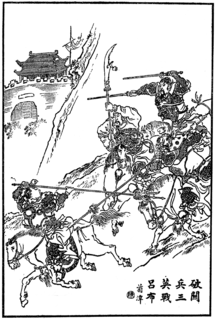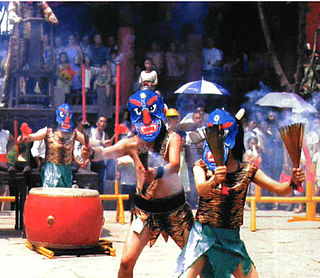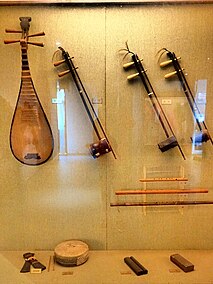Huaguxi (花鼓戏 pinyin :Huāgǔxì; literally: "flower drum opera") is a form of Chinese opera originating in Hunan province. It is known in China for its earthy quality, and is often referred to as the "spicy" form of Chinese opera. Huaguxi is known to have existed as early as 1695, during the Qing Dynasty. Unlike other forms of Chinese opera, Huaguxi originally had only two roles. These including the xiao chou, a small male clown, and the xiao dan, a vivacious young girl. The female role was played by men until women entered Chinese opera in the early 20th century. In the mid-18th century, a xiao shen role was added. This role refers to handsome young males. [1]
Hanyu Pinyin, often abbreviated to pinyin, is the official romanization system for Standard Chinese in mainland China and to some extent in Taiwan. It is often used to teach Standard Mandarin Chinese, which is normally written using Chinese characters. The system includes four diacritics denoting tones. Pinyin without tone marks is used to spell Chinese names and words in languages written with the Latin alphabet, and also in certain computer input methods to enter Chinese characters.

Traditional Chinese opera, or Xiqu, is a form of musical theatre in China with roots going back to the early periods in China. It is an amalgamation of various art forms that existed in ancient China, and evolved gradually over more than a thousand years, reaching its mature form in the 13th century during the Song dynasty (960–1279). Early forms of Chinese theater are simple, but over time they incorporated various art forms, such as music, song and dance, martial arts, acrobatics, costume and make-up art, as well as literary art forms to become traditional Chinese opera.

Hunan is a province of the People's Republic of China, located in the middle reaches of the Yangtze watershed in South Central China; it borders the province-level divisions of Hubei to the north, Jiangxi to the east, Guangdong and Guangxi to the south, Guizhou to the west, and Chongqing to the northwest. With a population of just over 67 million as of 2014 residing in an area of approximately 210,000 km2 (81,000 sq mi), it is China's 7th most populous and the 10th most extensive province-level by area.
Contents
Most Huaguxi plays were originally xiao xi, short plays lasting an hour or less. These plays often dealt with everyday rural life. With the rise of professional Huaguxi performers and performances in the capital city of Changsha, longer plays, daxi began to be performed. These plays dealt with grander themes of social satire and class struggle. Like other forms of Chinese opera, Huaguxi is staged with very few props. Music accompanying Huaguxi reflects the Changsha dialect spoken in Hunan. It is played with instruments like the datong (fiddle), yueqin (moon lute), dizi (bamboo flute), and suona (oboe). Percussion instruments provide the basic tempo for the performance. [1]

Changsha is the capital and most populous city of Hunan province in the south central part of the People's Republic of China. It covers 11,819 km2 (4,563 sq mi) and is bordered by Yueyang and Yiyang to the north, Loudi to the west, Xiangtan and Zhuzhou to the south, Yichun and Pingxiang of Jiangxi province to the east. According to 2010 Census, Changsha has 7,044,118 residents, constituting 10.72% of the province's population. It is part of the Chang-Zhu-Tan city cluster or megalopolis.
Changsha dialect is a dialect of New Xiang Chinese. It is spoken predominantly in Changsha, the capital of Hunan province. It is not mutually intelligible with Standard Mandarin, the official language of China.
The datong (大筒) is a bowed string instrument in the huqin family, and is used as an accompanying instrument in the huaguxi opera tradition of Hunan, China. Referring to this role, the instrument is also referred to huagu datong (花鼓大筒).
Throughout much of its history, Huaguxi could not be performed legally because of the perception that it was an obscene form of opera. It was officially recognized by the People's Republic of China in 1952, but restrictions were placed on the type of material that could be performed. [1]














